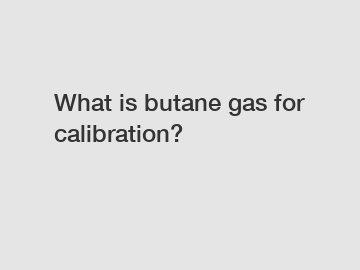What is butane gas for calibration?
Have you ever wondered how devices like gas detectors, gas analyzers, and gas chromatographs are able to provide accurate measurements of the gases they are designed to detect? The key lies in calibration, a process that involves setting a reference point by using a known gas concentration. One of the gases commonly used for calibration is butane gas.
Butane gas is a colorless, flammable gas that is commonly used as a fuel for lighters and camping stoves. However, it also has important applications in the field of gas detection and analysis. When used for calibration purposes, butane gas serves as a reference point for setting accurate measurements on gas detection devices.
The calibration process involves exposing the gas detection device to a known concentration of butane gas and adjusting the device's settings to match the measured concentration. This ensures that the device is able to accurately detect and measure the gases it is designed to monitor.

Butane gas is an ideal choice for calibration purposes for several reasons. It is readily available, easy to handle, and has a known vapor pressure, making it easy to calculate the gas concentration. In addition, butane gas is non-reactive and does not corrode or damage the sensors in gas detection devices, making it a safe and reliable option for calibration.
One of the key benefits of using butane gas for calibration is its stability. Unlike some other calibration gases, butane gas does not undergo chemical reactions or degrade over time, ensuring consistent and accurate calibration measurements. This stability is crucial for ensuring the reliability and accuracy of gas detection devices in various applications.
Butane gas calibration is commonly used in industries such as environmental monitoring, industrial hygiene, and laboratory analysis. In environmental monitoring, gas detectors are used to measure pollutants in the air, water, and soil to ensure compliance with environmental regulations. Calibration with butane gas helps ensure that these measurements are accurate and reliable.
In industrial hygiene, gas detectors are used to monitor workplace environments for hazardous gases and vapors that may pose a risk to workers' health and safety. Calibration with butane gas ensures that these devices are able to accurately detect and measure these gases, helping to prevent exposure and minimize the risk of workplace accidents.
In laboratory analysis, gas chromatographs are used to separate and analyze complex mixtures of gases. Calibration with butane gas helps ensure that these analyses are accurate and precise, allowing researchers to obtain reliable results and make informed decisions based on their findings.
Overall, butane gas calibration plays a vital role in ensuring the accuracy and reliability of gas detection and analysis devices. By providing a stable reference point for calibration measurements, butane gas helps to ensure that these devices are able to provide accurate measurements in a wide range of applications.
In conclusion, butane gas calibration is a crucial process for ensuring the accuracy and reliability of gas detection and analysis devices. Its stability, availability, and non-reactive nature make it an ideal choice for calibration purposes in various industries. By using butane gas for calibration, researchers, technicians, and workers can trust that their gas detection devices are providing accurate and reliable measurements, helping to protect the environment, ensure workplace safety, and advance scientific research.
If you are looking for more details, kindly visit sulfur tetrafluoride gas, sf6 gas properties, acetylene gas supplier.
114
0
0


Comments
All Comments (0)